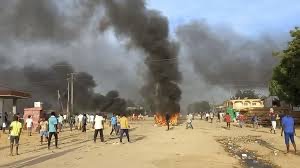Chad’s President Says He Forgives Those Who Demonstrated On October 20
Mahamat Idriss Derby, Chad’s transition president, has come under criticism for saying he forgives all who were part of the uprising of Oct. 20, 2022, during which up to 50 people were killed. They believe him responsible for the deaths and say he should be seeking forgiveness, not offering it.

Mr Mahamat, while receiving wishes from the country’s superior council for Islamic Affairs on the heels of the Tabaski feast yesterday, said all those involved in demonstrations, convicted or not, have been forgiven.
“From the top of this tribune, I forgive all those involved, convicted or not, who committed damage during the insurrection of October 20, 2022,” says Mahamat Idriss Deby.
Demonstrations sparked in N’Djamena last year on October 20 after Mahamat Idriss Derby seized power following the death of his father Idriss Derby. He promised an 18-month transition process to elections. He, however, later announced it would be pushed forward to two years.
The country’s Prime Minister during a press conference put the death toll from the resulting demonstrations to 50. The country’s security forces had used force and live rounds on the protesters, causing officials from the United Nations to condemn the approach.
The United Nations also reported some 50 people were killed, including a journalist, and nearly 300 were injured. At least 500 people were arrested. Demonstrations were called by opposition parties and civil society leaders.
Human rights groups said unarmed civilians were massacred as security forces brutally cracked down on demonstrations in the capital, N’Djamena, and several other cities.
Many Chadians believe the President should rather be apologizing rather than extending a hand of forgiveness.
“Have you heard the message? He murders people and pretends they are guilty and not victims. He didn’t ask for forgiveness, he rather forgives,” cries Vivian Solngar, a Chadian citizen.
To some others, the friendly hand offered by the Head of State is a farce following his past outings, which led to more reprisals.
“He asked for forgiveness during the national dialogue but what happened later?” questioned Ferdinand Adira, another citizen.
The October 20 demonstrations occurred a few days after a national dialogue called by the transitional government to pave the way for a presidential election, which was later pushed to two years.
“The violence against protesters was extreme and disproportionate, leaving scores dead and wounded, and hundreds detained without access to lawyers or family,” said Lewis Mudge, Central Africa director at Human Rights Watch.
It is reported over 150 persons still face trials from the demonstrations, while some 401 have been tried. President Mohammad didn’t specify if anyone will be released after his declaration.
Support Our Journalism
There are millions of ordinary people affected by conflict in Africa whose stories are missing in the mainstream media. HumAngle is determined to tell those challenging and under-reported stories, hoping that the people impacted by these conflicts will find the safety and security they deserve.
To ensure that we continue to provide public service coverage, we have a small favour to ask you. We want you to be part of our journalistic endeavour by contributing a token to us.
Your donation will further promote a robust, free, and independent media.
Donate HereStay Closer To The Stories That Matter




